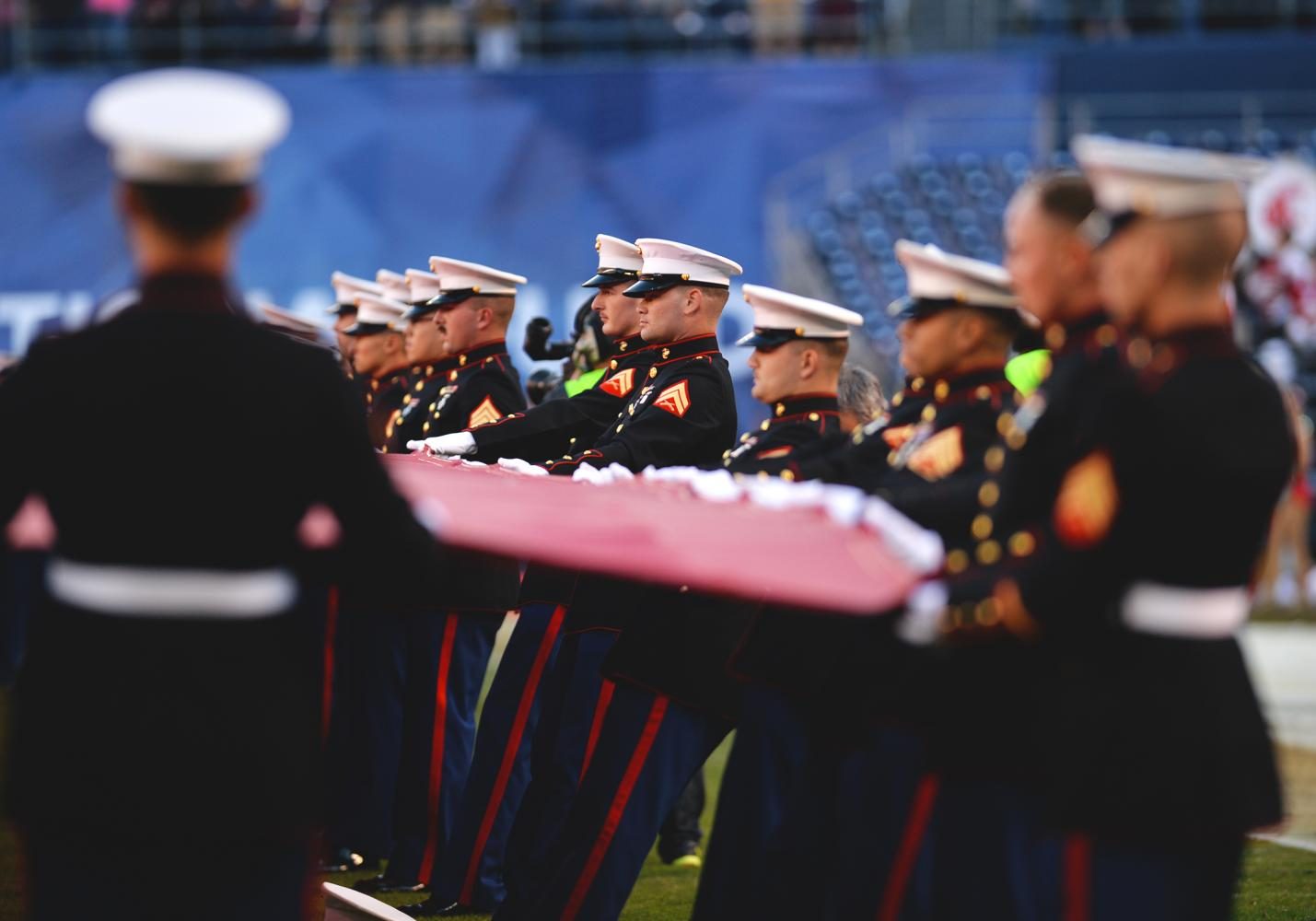Deteriorating embedment of nationality and sports
Athletes will not stand if racial prejudice is displayed
LUKE HOLLISTER | Daily Evergreen File
Members of the Marine Corps display the American flag during the Holiday Bowl pregame on December 27, 2016 at Qualcomm Stadium in San Diego, CA.
September 21, 2017
There are countless ways in which our national anthem and sports immerse in one another. If you think about what this country was built upon and what we seem to glorify, there is no denying the connection.
The lyrics in the anthem reveal themes of battle and eventually prevailing, which is awfully similar to what a sporting event entails. In sport, teams and athletes battle and one prevails victorious every time.
Patriotism in sport was largely reinforced after 9/11, a time when America needed healing. The American medicine that is sports created a fan unity and people didn’t seem to take the anthem for granted as much.
One would think it would be hard to imagine a contest without the national anthem beforehand, but lately, too many instances of racial injustice have highlighted the hypocritical aspects of the song. If all of us don’t believe in the words of the anthem, what good is it?
The issue of not standing for the national anthem has never been as prevalent as it is now. It seems like every NFL game I watch, someone on either side is sitting or kneeling. We are reaching a boiling point with the racial inequality demonstrated by too many of our justice departments.
Walk in Michael Bennett’s shoes for a moment. You can understand why he would not want to stand for an anthem that states “land of the free,” after he experienced racial prejudice from law enforcement in Las Vegas.
I reached out to Thabiti Lewis, an English professor at WSU Vancouver, to talk about this trending issue. He referred back to when former NBA player Mahmoud Abdul-Rauf sat during the national anthem in 1996, citing the flag was a symbol of oppression and America’s long history of tyranny.
The NBA suspended Rauf for his actions until they reached a compromise where he had to stand, but could close his eyes and look downward.
“Ironically, the NFL doesn’t have a policy [for standing during the anthem] whereas the NBA does,” Lewis said.
Another angle to this dilemma is how coaches and organizations are handling what their players are demonstrating during the anthem. Each athletes’ actions reflect back on the team itself, and that is something many coaches are embracing, while others not so much.
“You have a mixture of approaches among coaches, there’s a need to be very strategic,” Lewis said. “[Golden State Warriors Head Coach] Steve Kerr was encouraging his team to make political stances, in which he would support.”
The platform athletes have is such a great asset to have because voices and actions can be seen and heard from a mass audience, thus creating awareness and hopefully change.
It all stems from how our law enforcement treats minority races. Once that changes, this recurring issue will be deceased. If it doesn’t, leagues might be trying to decide how to minimalize a political issue that is detracting from the game itself.
Whether it’s not televising the anthem or just getting rid of it completely, I cannot imagine the anthem continuing the way it is with so many people not standing for it. This will only perpetuate the continual injustice uprising — one that may not be fixed no matter how much awareness is raised.
“I don’t think it will be soon, unfortunately,” Lewis said regarding how long until all players stand for the anthem again. “The issue will get more attraction if white athletes step up.”
The reality is that we live in a country where many white people have racial tendencies or biases. Unfortunately, I don’t foresee a time when all the conflicts between law enforcement and racial prejudice suddenly go away.
If racial injustice persists, players will respond back in the most powerful way possible; unrecognizing an anthem that is intended to exemplify freedom. Everyone hates a hypocrite.









